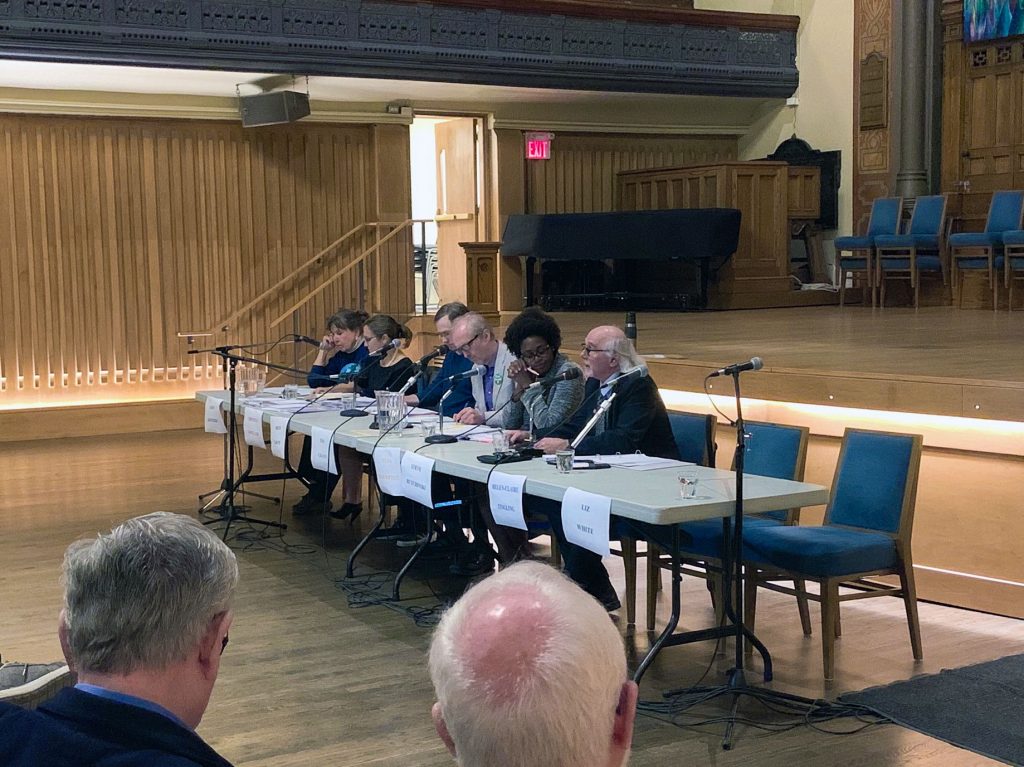Conservative candidate absent for climate-dominated debate

By Ahmed Hagar
Every candidate but the Conservative party’s Helen-Claire Tingling running to represent the constituents of the University-Rosedale riding made it to the planned all-candidates forum on October 7. The climate crisis dominated the conversation and all present agreed that implementing policy to combat it was critical, but each expressed different approaches to doing so.
“We need emergency mobilization to enact critically needed legislation. The Paris Agreement gives us 11 years to bring our carbon use down. We do not know if we have that much time.”
— Karin Brothers, Stop Climate Change party
Rory Gus Sinclair, the former chair of the Harbord Village Residents’ Association, moderated the debate. All five local residents’ associations shared the responsibility of hosting the event.
Green party candidate Tim Grant described the election as a “climate election”. Some of the candidates voiced their disagreement with the Liberals approving pipelines, such as Trans Mountain and Keystone XL.
Chrystia Freeland discussed the Liberal party’s commitment to plant two billion trees nationwide, saying “trees are one of nature’s best technologies to fight climate change.”
As a member of the Stop Climate Change party, Karin Brothers said the party’s main goal is to transition Canada to renewable energy. Their plans include making electric cars toll-free and increasing public transportation funding to reduce reliance on vehicles.
“We need an emergency mobilization to enact critically needed legislation,” she said. “The Paris Agreement gives us 11 years to bring our carbon use down. We do not know if we have that much time.”
Hecklers disrupted the event on several occasions, voicing their disagreements with Freeland on climate change, NAFTA, and foreign affairs. In a few instances, audience members argued with the moderator and the audience.
“You can do some heckling, but a bunch of you are doing it every 15 seconds,” Sinclair said. “We are going to ask you to cooperate, otherwise we have got a problem.”
On the topic of immigration, the candidates discussed supporting migrants and refugees. Steve Rutchinski of the Marxist-Leninist party argued for Canada to build international relations based on mutual respect and benefit.
“If you want to stop the migration crisis, you stop the wars,” he said. “Those people who are victims of this should not be further penalized because they find themselves in these intolerable conditions.”
The candidates also answered questions about congestion and transit infrastructure in the city. Tim Grant, of the Green party expressed support for “a new deal” for cities and for tying federal infrastructure funding to transit planning that can be accessible and sustainable.
“The new subway and LRT lines for the past 30 years have been commuter lines that have been empty 16 hours a day,” he said. “The TTC has been in a worse financial condition when the stations were open because there are not enough people to ride them.”
On foreign policy, Communist party candidate Drew Garvie argued that the Liberal party’s lack of oversight over Canadian-based mining companies has led to their impact internationally.
“We have some of the most lax laws that allow these companies to act with impunity,” he said. “That allows for outrageous things, like our foreign policy with Venezuela.”
Freeland said that the Liberal party appointed an ombudsman to monitor mining companies and their international operations. She also said Venezuela was an issue that was about “democracy and authoritarianism”, which garnered a loud response from hecklers.
Another topic of discussion was affordable housing. All candidates supported the notion of housing being a human right. As a local affordable housing advocate, Vajda said that “people are feeling left behind” and the NDP platform would build 500,000 new units across the country.
“I have been on the other side where we are trying to get developers to set aside 10 per cent of units for affordable housing,” she said. “It is a battle and it does not always work.”
With the concluding statements, Freeland supported having a dialogue with various perspectives within the community and said that her focus will be to maintain liberal democracy if re-elected.
“Canada today is the strongest liberal democracy in the world,” she said. “And we, as a community and citizens, need to make our civic fabric strong.”
READ MORE ON THE 2019 FEDERAL ELECTION:
- EDITORIAL CARTOON: How nice (Oct. 2019)
- FOCUS: Federal election candidates queried (Oct. 2019)
- FORUM: Vajda makes the NDP case (Oct. 2019)
- GREENINGS: Another election, another round of disappointing platforms(Oct. 2019)
- FORUM: Hold Conservative MPPs to account (Sept. 2019)
- FORUM: “If you work hard, you should be able to buy a home” (Sept. 2019)
- FORUM: Tim Grant wants to be your Green voice in Ottawa (Sept. 2019)
